How to Conduct a Motor Vehicle Background Check

Introduction to Motor Vehicle Background Checks
A motor vehicle background check is an essential tool used to assess a person’s driving history and related vehicle records. This check involves reviewing an individual’s driving record, past traffic violations, accidents, DUI offenses, license status, and vehicle registrations. Motor vehicle background checks are commonly used by employers, insurance companies, law enforcement agencies, and individuals to make informed decisions about the risks associated with driving or vehicle ownership.
Whether you’re hiring a driver, assessing a potential employee’s driving abilities, evaluating an insurance risk, or reviewing legal matters, a motor vehicle background check provides crucial insights into a person’s history on the road. It gives a comprehensive understanding of their driving habits, any traffic infractions or criminal offenses related to driving, and the legal status of their driving privileges.
Why Are Motor Vehicle Background Checks Important?
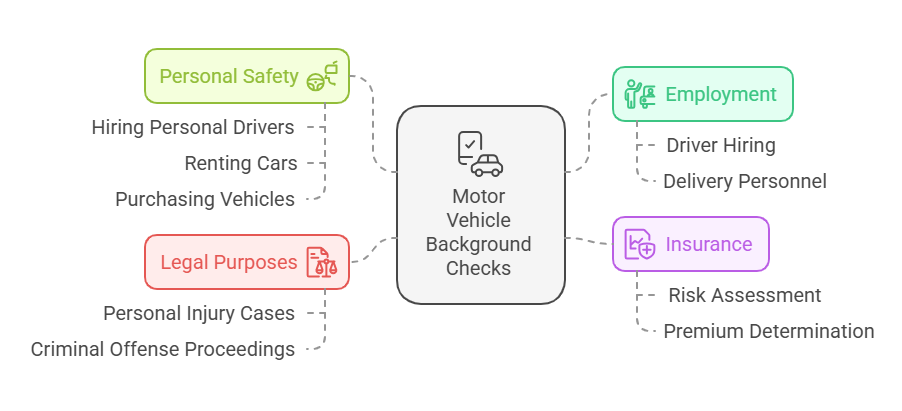
Motor vehicle background checks are necessary for several reasons. They help ensure safety and accountability when it comes to driving, which is vital for employers, insurance companies, and other entities that need to mitigate risks associated with transportation.
- Employment: Employers often perform motor vehicle background checks when hiring drivers, delivery personnel, or individuals who are required to operate vehicles as part of their job. These checks allow employers to ensure that their employees have a safe driving record, reducing the risk of accidents and liabilities.
- Insurance: Insurance companies use motor vehicle background checks to assess the risk associated with insuring a driver. A person’s driving history, including traffic violations, accidents, and DUIs, can impact the premiums they are charged. Insurers rely on this data to determine the likelihood of future claims, and thus, the cost of coverage.
- Legal Purposes: Motor vehicle background checks are also used in legal matters, such as during a personal injury case or car accident lawsuit. The records may be used as evidence in court to determine fault or to assess damages. Additionally, courts may require a motor vehicle background check as part of the proceedings for individuals involved in criminal driving offenses, such as DUIs.
- Personal Safety: Individuals who are considering hiring a personal driver, renting a car, or purchasing a vehicle may also use motor vehicle background checks to evaluate the safety and reliability of the person or vehicle in question.
Types of Information Included in a Motor Vehicle Background Check
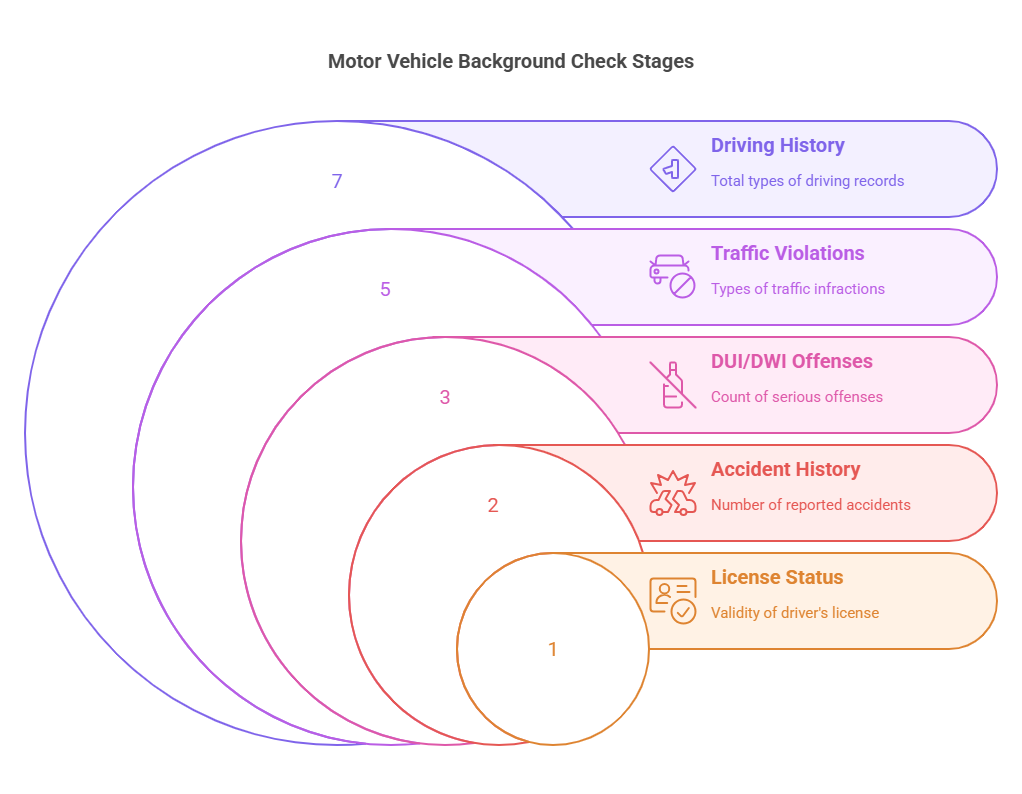
Motor vehicle background checks offer a wide array of information, which typically includes:
- Driving History: This section includes an individual’s past driving behavior, such as the number of tickets issued, the nature of the violations (e.g., speeding, running a red light), and any serious offenses. It reflects the individual’s adherence to traffic laws and their overall safety on the road.
- Traffic Violations: Motor vehicle background checks can reveal any traffic violations an individual has committed. This includes minor infractions like speeding tickets or seatbelt violations, as well as more serious violations such as reckless driving or driving without a license.
- DUI/DWI Offenses: One of the most significant aspects of a motor vehicle background check is checking for DUIs (driving under the influence) or DWIs (driving while intoxicated). These offenses can have severe legal and financial consequences and are crucial for employers, insurers, and legal authorities to assess the risk associated with a driver.
- Accident History: A background check may include details about any accidents the individual has been involved in. This can range from minor fender-benders to serious, life-altering collisions. Understanding an individual’s accident history helps assess whether they may pose a greater risk on the road.
- License Status: A motor vehicle background check will also confirm whether an individual’s driver’s license is valid, expired, suspended, or revoked. It will provide information on any restrictions, such as the need for corrective lenses or geographic limitations on driving.
- Vehicle Registrations: For vehicle owners, a background check will include details about the vehicles they own, including registration status, make and model, and whether the vehicle has ever been involved in any legal issues, such as being reported as stolen.
- Insurance Coverage History: In some cases, a motor vehicle background check will also include information about the individual’s past insurance coverage, which can provide further context regarding their driving behavior and insurance risk.
In summary, a motor vehicle background check offers a holistic view of an individual’s driving and vehicle history. It plays an important role in determining safety, risk factors, and legal compliance related to driving.
When and Why Is a Motor Vehicle Background Check Used?
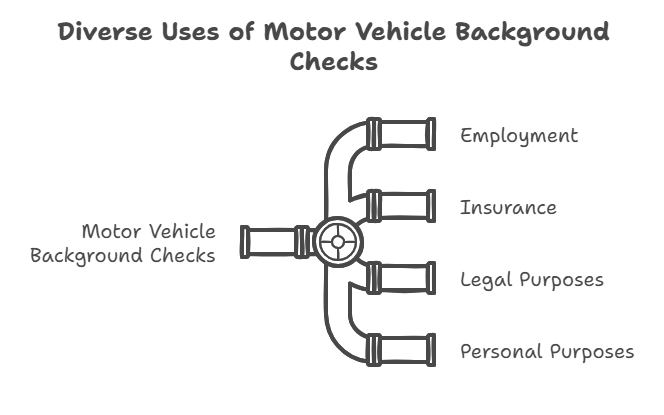
Motor vehicle background checks are used in various situations, often when there is a need to ensure that an individual meets specific criteria related to their driving behavior or legal standing.
- For Employment: Employers use motor vehicle background checks to assess the suitability of candidates for jobs involving transportation responsibilities. These roles may include truck drivers, delivery drivers, chauffeurs, rideshare drivers, and other positions where driving is an integral part of the job. The check allows employers to ensure that the person has a safe driving record and poses minimal risk of accidents or liabilities.
- For Insurance: Insurance companies utilize motor vehicle background checks to calculate premiums and assess risk. A driver with a clean driving record and no history of accidents or violations will typically have lower insurance premiums than one with multiple violations or accidents on their record. Insurance companies also rely on these checks to confirm the validity of driving histories and to ensure the individual’s risk profile aligns with the pricing.
- Legal Purposes: In the legal realm, motor vehicle background checks are used to establish the facts surrounding a case. For instance, during a car accident lawsuit, the parties may conduct a background check on the involved drivers to determine if they have any prior violations that could contribute to the determination of fault. In criminal cases, such as DUI offenses, a check is used to track the individual’s driving history and potential repeat offenses.
- For Personal Purposes: If you’re hiring a private driver or purchasing a vehicle, you might want to conduct a motor vehicle background check to ensure the individual or vehicle meets your safety and legal requirements. This helps mitigate the risk of hiring an unsafe driver or buying a vehicle with an unclear history.
Motor vehicle background checks are also becoming more common in ridesharing services like Uber or Lyft, where drivers are required to pass a background screening to ensure they have a safe driving history before accepting passengers.
How Motor Vehicle Background Checks Are Conducted
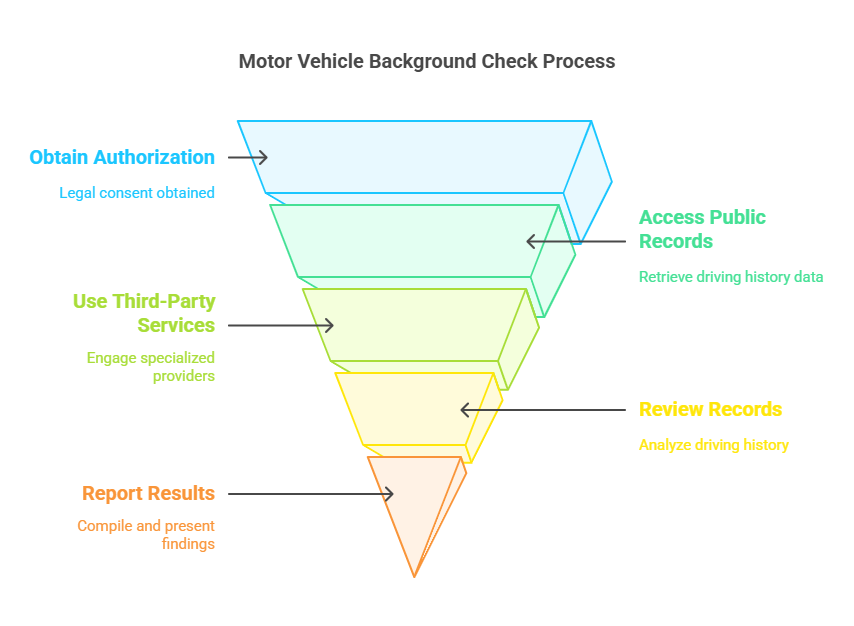
Motor vehicle background checks provide essential information about an individual’s driving history, vehicle registrations, and any legal issues related to driving. The process of conducting these checks involves gathering records from various sources, including government databases, state agencies, and private entities. Here’s a detailed overview of the typical process involved in conducting a motor vehicle background check:
- Obtaining Authorization: Before conducting a motor vehicle background check, it is essential to obtain written consent from the individual being checked. This is a legal requirement in many regions under regulations such as the Fair Credit Reporting Act (FCRA) in the United States, which mandates employers and organizations to get permission before accessing an individual’s driving record.
- Accessing Public Records: Motor vehicle records are typically stored in state or national databases, which are accessible by authorized personnel or organizations. These records can include information about a person’s driver’s license status, traffic violations, accident history, and DUI offenses. Depending on the jurisdiction, motor vehicle records can either be accessed online or through physical visits to state or local motor vehicle departments.
- Using Third-Party Services: Many organizations choose to work with third-party background check providers, such as Exact Background Checks, to conduct motor vehicle screenings. These services have established relationships with state and local agencies, allowing them to quickly access comprehensive data from various jurisdictions and ensure the accuracy of the information.
- Reviewing the Records: Once the necessary data is collected, the records are analyzed to identify any relevant information. This can include violations, accidents, DUIs, license suspensions, and other significant events in the individual’s driving history. If a motor vehicle background check is being performed for employment purposes, the employer will assess whether the individual’s driving record meets the organization’s standards and safety requirements.
- Reporting the Results: The results of the motor vehicle background check are compiled into a comprehensive report that is provided to the requesting party. The report includes information about the individual’s driving history, including any traffic tickets, accidents, and offenses. In some cases, the report may also include details on the person’s current license status and vehicle registrations. The findings are typically reviewed by the requesting organization to make informed decisions regarding hiring, insurance, or legal matters.
Factors That Affect the Accuracy and Speed of Motor Vehicle Background Checks
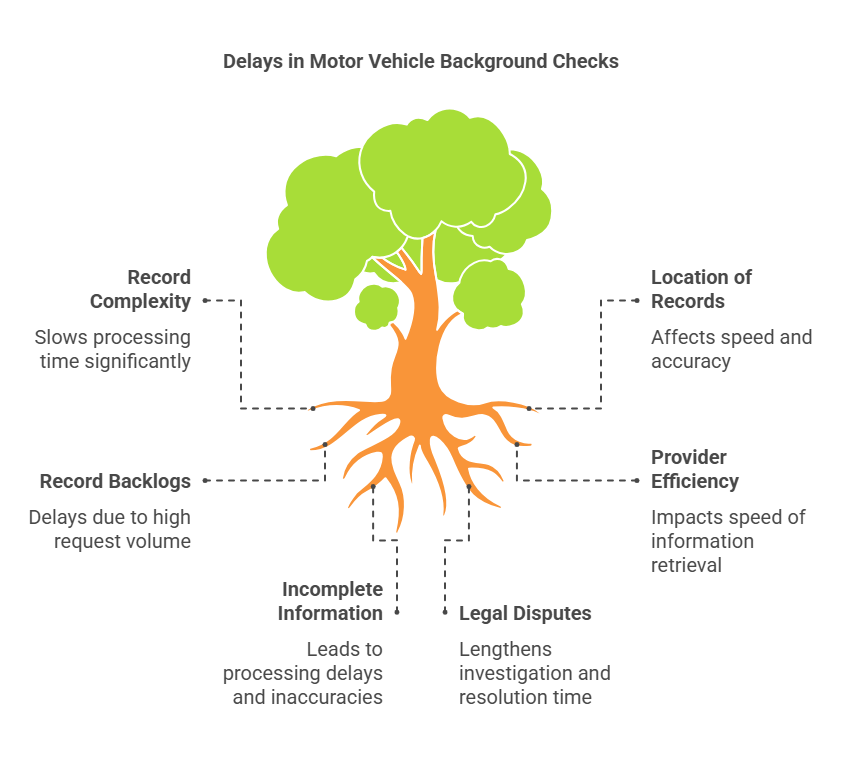
While motor vehicle background checks are highly effective tools for gathering critical driving information, several factors can affect both the accuracy and speed of the process. Understanding these factors can help individuals and organizations ensure that they receive the most reliable and timely information.
- Type of Record Requested: The complexity of the record requested can impact the time it takes to process the background check. For instance, a basic driving history report may only take a few minutes or hours to complete, while more detailed checks, such as accident history or DUI records, may take longer due to the additional investigation required.
- State vs. National Records: The location of the individual plays a significant role in the speed and accuracy of a motor vehicle background check. For example, a state-specific background check may take less time to process, as it only involves accessing records from that state. However, a nationwide background check, which looks at an individual’s driving record across multiple states, will require more time to complete due to the coordination with multiple state agencies. Furthermore, discrepancies in how states maintain records may affect the accuracy of the results.
- Backlog and Availability of Records: The availability and quality of records maintained by motor vehicle departments can affect the speed of a background check. Some states or jurisdictions may have backlogs of requests, which could delay the processing time. Additionally, some jurisdictions may not have up-to-date records, which can result in incomplete or inaccurate information.
- Third-Party Provider Efficiency: When organizations rely on third-party background check services, the efficiency and reliability of the provider play a crucial role in how quickly the results are returned. Established companies like Exact Background Checks often have automated systems and well-established connections with motor vehicle departments, enabling them to access information quickly and accurately.
- Completeness of the Information Provided: The accuracy and speed of a motor vehicle background check also depend on the completeness of the information provided by the individual being checked. Full names, date of birth, address history, and driver’s license numbers are all essential pieces of information for conducting a thorough check. If any details are missing or incorrect, it could delay the process or lead to inaccurate results.
- Discrepancies in the Driving Record: In some cases, discrepancies between an individual’s self-reported driving history and the records retrieved during the check can cause delays or confusion. These discrepancies may be the result of clerical errors, past suspensions, or lapses in record-keeping. Resolving these issues may require additional communication with state agencies, further delaying the process.
- Legal Issues or Disputes: If the individual has been involved in a legal dispute regarding their driving record (e.g., contested DUI charges or traffic tickets), this may also cause delays in obtaining accurate information. Legal challenges can result in lengthy investigations or appeals, which can slow down the background check process.
Services Offered by Exact Background Checks
Exact Background Checks offers a range of services for both employers and individuals who need to perform motor vehicle background checks. These services are designed to provide accurate, thorough, and timely results, while ensuring compliance with relevant laws and regulations. Below are some of the key services provided:
- Comprehensive Driving History Reports: Exact Background Checks offers detailed reports that include an individual’s driving history, including traffic violations, accidents, DUIs, license suspensions, and other relevant information. These reports provide employers and insurers with the insights they need to assess risk and make informed decisions.
- Verification of License Status: Exact Background Checks can verify the current status of an individual’s driver’s license, ensuring that it is valid, active, and free of suspensions or restrictions. This service is particularly important for employers who rely on employees to operate vehicles as part of their duties.
- National and Statewide Checks: Exact Background Checks offers both state-specific and national background checks, allowing employers to obtain driving records from a single state or across multiple jurisdictions. These comprehensive checks provide a complete picture of an individual’s driving history.
- DUI and Accident History: For employers and insurers, Exact Background Checks provides access to records related to DUI offenses, accidents, and any other serious driving infractions. This information is essential for determining an individual’s risk level in relation to operating vehicles in a professional setting.
- Customized Background Check Solutions: Exact Background Checks offers tailored solutions based on specific needs. Whether you’re hiring for a delivery position, rideshare driver, or any role requiring driving, they can customize background check packages to suit the organization’s specific requirements.
- Timely and Efficient Processing: Exact Background Checks ensures that all motor vehicle background checks are processed quickly and accurately, providing results in a timely manner. Their efficient system and expert team help minimize delays and ensure that all relevant data is included in the report.



